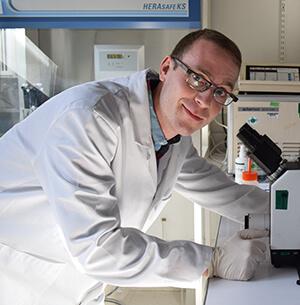IMPACT's featured student this issue is Benjamin King, a PhD candidate in the interdisciplinary Cellular, Molecular & Biomedical Sciences program at the University of Vermont, currently studying at the Pasteur Institute in Paris, France.
IMPACT: Ben, tell our readers a little bit about yourself and what the focus of your undergraduate studies was?
BK: I grew up in Southwest Missouri. I have always loved broadening my horizons, so when I was applying to undergraduate programs, I looked primarily at small liberal arts colleges in the Northeast. In the end, I chose to go to Middlebury College for academic reasons as well as for its lovely rural setting.
I began my studies with the plan to major in environmental sciences with a focus in conservation biology. I also took advantage of Middlebury's highly regarded language programs to study the French language.
My junior year at Middlebury, I spent my spring semester studying abroad in Madagascar, a francophone island country off the east coast of Africa, where I, along with a group of other American students, studied its ecology and conservation biology.
While Madagascar has some of the most impressive biodiversity on Earth, I was struck that the conservation of natural resources there was, in reality, dependent on the health and well being of the local people who lived in its close proximity. That is, unless the people had the opportunity to make a livelihood, creating protected natural reserves with the goal of preserving biodiversity would ultimately be doomed to fail. Thus, my conception of conservation evolved from a science-based approach to better understand the workings of ecosystems -- in order to inform better plans for their protection -- to one where I came to see global political and economic systems as the central determinant of the living conditions of people at these local levels.
With this new belief that an investment in the health of people (both physical and economic) was critical to the success of any natural resource protection plan, I slightly altered the course of my last year at Middlebury. In the end, I majored in biology with the goal to go into medical research that would focus on diseases that disproportionately affect those living in less developed countries.
IMPACT: Middlebury’s a great school, and it’s always interesting to see what inspires students. What led you to attend graduate school at UVM?
BK: During my time as an undergraduate, I had come to love Vermont and I knew that this would be a perfect place to spend the next several years while I was working on my graduate studies. In addition, I had worked with Dr. Ralph Budd in the UVM College of Medicine as a summer intern after graduating from Middlebury. This gave me a view of the vibrant research atmosphere and collegial environment at UVM -- both of which were major attractions for me.
IMPACT: So your path was Missouri to Middlebury to Burlington. Tell us about your experiences in grad school -- what it is like to work with faculty members and do your own research and scholarship?
BK: I had the good fortune to join Dr. Jason Botten's lab where we study the cellular biology of the arenaviruses. I was particularly drawn to Dr. Botten's research because this is a family of viruses that are endemic to West Africa, where they represent a significant threat to public health. These viruses rarely affect people in Europe or North America, which is why most people have never heard of them. Currently there are no FDA-approved vaccines or antiviral drugs, so the work we do has the potential to greatly contribute to advances in our understanding and treatment of these viral infections in the future.
IMPACT: It’s been interesting to communicate with you about this story because you are in Paris! That's very exciting -- what’s it like?
BK: That’s correct. I am currently in Paris, France, working at the Pasteur Institute in the laboratory of Dr. Christophe Zimmer. Last summer, I was awarded a Chateaubriand Fellowship by the French Embassy to the United States to support my travel to France and to allow me to perform collaborative research in a laboratory with complementary interests and expertise.
Since arriving at the Pasteur Institute in late October, I have been learning and applying super-resolution microscopy techniques, as well as image analysis methods, that allow the quantification and modeling of poorly understood steps of the lifecycle of these viruses. This has been a very rich academic exchange as it unites the strong cell biology and virology expertise of our lab at UVM with the strong physics and image analysis background of the lab here in Paris.
IMPACT: Tell us where you are in your graduate education and what you plan to do after graduation?
BK: During my time as a graduate student, I have greatly enjoyed the process of designing and carrying out a research project. I am nearing the end of my PhD, though a date for the defense has not yet been set. In the future, I see myself following an academic career path. My next step is to do a post-doctoral fellowship to continue developing the skill sets I will need to succeed as an independent scientist. After, I hope to secure a faculty position and start a laboratory of my own.
I have quite diverse academic interests. I am realizing more and more that these do not exist in isolation of each other. For example, the link between a fluency in French from several years of study and a career in the sciences is not an obvious one. Nevertheless, I find myself here in Paris at a world-renowned research institute specializing in the study of infectious diseases. So I think it's interesting how two pursuits, which may superficially have very little in common, may open a door into something really cool that may otherwise have been impossible.
